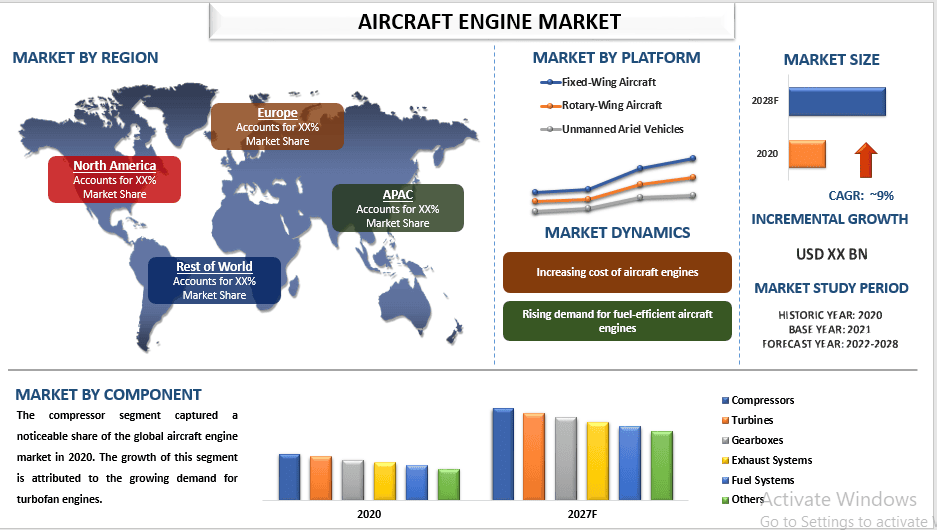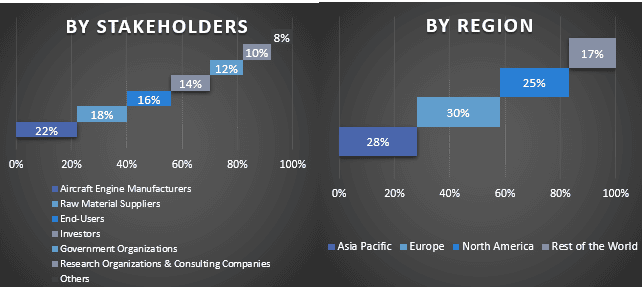- Home
- About Us
- Industry
- Services
- Reading
- Contact Us
Aircraft Engine Market: Current Analysis and Forecast (2022-2028)
Emphasis on Type (Turboprop, Turbofan, Turboshaft, and Piston Engine); Component (Compressors, Turbines, Gearboxes, Exhaust Systems, Fuel Systems, and Others); Platform (Fixed-Wing Aircraft, Rotary-Wing Aircraft, and Unmanned Ariel Vehicles); Technology (Conventional and Hybrid); and Region/Country

The global Aircraft Engine Market is expected to grow at a growth rate of around 9% during the forecast period 2022-2028. An aircraft engine is a component of an aircraft’s propulsion system that produces mechanical power. Aircraft engines are most often either light piston engines or gas turbines. The growing commercial aircraft operations and rise in military aircraft operations are some of the most prominent factors impacting the aircraft engine market. In addition, factors such as increasing demand for fuel-efficient aircraft engines, increasing demand for unmanned aerial vehicles (UAVs) for commercial and military applications, and growing collaboration for developing advanced aircraft engines are boosting the growth of the aircraft engine market. For instance, GE Aerospace extended a contract with Tata Advanced for aircraft engine components. The multi-year long-term contract is valued at over USD 1 Bn and will extend well beyond 2030.
Some of the major players operating in the market include General Electric, Rolls-Royce plc, Raytheon Technologies Corporation, Safran, Honeywell International Inc., Textron Inc., International Aero Engines AG, The Williams Companies Inc., MTU Aero Engines AG, Eurojet are some of the key players in the market. Several M&As along with partnerships have been undertaken by these players to facilitate customers with hi-tech and innovative products/technologies.
Insights Presented in the Report
“Amongst type, turbofan engine segment to witness robust CAGR during the forecast period”
Based on type, the market is classified into turboprop, turbofan, turboshaft, and piston engines. Among these, the turbofan engine is expected to grow at a high CAGR during the forecast period. This is because most modern airliners use turbofan engines because of their high thrust and good fuel efficiency. This type of engine is commonly used on wide-body airliners like the Boeing 747 and the Airbus A300.
“Amongst technology, the fixed-wing segment held a significant share in the market in 2020”
Based on platform, the market is divided into fixed-wing aircraft, rotary-wing aircraft, and unmanned ariel vehicles. The fixed-wing segment catered to a prominent share of the global aircraft engine market in 2020. Flexibility, data security, high speed, and low latency are the most prominent factors driving the growth of this segment. The on-premises deployment provides physical control to the enterprises over the data, it keeps access to critical data limited to the enterprises only.
“Asia Pacific held a notable share in the market in 2020”
The Asia-Pacific is anticipated to hold a prominent share of the global aircraft engine market during the forecast period majorly due to the rising defense budget of major economies in the region. This has created the demand for the procurement of military helicopters and fighter jets, which is expected to boost the growth of the market. For instance, in 2021, the Indian government spent USD 76.6 Bn on its military, out of which 39% was allocated to the Indian Air Force which was used majorly to build military aircraft indigenously.
Reasons to buy this report:
- The study includes market sizing and forecasting analysis validated by authenticated key industry experts.
- The report presents a quick review of overall industry performance at one glance.
- The report covers an in-depth analysis of prominent industry peers with a primary focus on key business financials, product portfolios, expansion strategies, and recent developments.
- Detailed examination of drivers, restraints, key trends, and opportunities prevailing in the industry.
- The study comprehensively covers the market across different segments.
- Deep dive regional level analysis of the industry.
Customization Options:
The global aircraft engine market can further be customized as per the requirement or any other market segment. Besides this, UMI understands that you may have your own business needs, hence feel free to connect with us to get a report that completely suits your requirements.
Table of Content
Research Methodology for the Aircraft Engine Market Analysis (2022-2028)
Analyzing the historical market, estimating the current market, and forecasting the future market of the global aircraft engine market were the three major steps undertaken to create and analyze the adoption of aircraft engine in major regions globally. Exhaustive secondary research was conducted to collect the historical market numbers and estimate the current market size. Secondly, to validate these insights, numerous findings and assumptions were taken into consideration. Moreover, exhaustive primary interviews were also conducted, with industry experts across the value chain of the global aircraft engine market. Post assumption and validation of market numbers through primary interviews, we employed a top-down/bottom-up approach to forecasting the complete market size. Thereafter, market breakdown and data triangulation methods were adopted to estimate and analyze the market size of segments and sub-segments of the industry pertains to. Detailed methodology is explained below:
Analysis of Historical Market Size
Step 1: In-Depth Study of Secondary Sources:
Detail secondary study was conducted to obtain the historical market size of the aircraft engine market through company internal sources such as annual reports & financial statements, performance presentations, press releases, etc., and external sources including journals, news & articles, government publications, competitor publications, sector reports, third-party database, and other credible publications.
Step 2: Market Segmentation:
After obtaining the historical market size of the aircraft engine market, we conducted a detailed secondary analysis to gather historical market insights and share for different segments & sub-segments for major regions. Major segments are included in the report as type, component, platform, and technology. Further country-level analyses were conducted to evaluate the overall adoption of testing models in that region.
Step 3: Factor Analysis:
After acquiring the historical market size of different segments and sub-segments, we conducted a detailed factor analysis to estimate the current market size of the aircraft engine market. Further, we conducted factor analysis using dependent and independent variables such as type, component, platform, and technology of aircraft engines. A thorough analysis was conducted for demand and supply-side scenarios considering top partnerships, mergers and acquisitions, business expansion, and product launches in the Aircraft Engine market sector across the globe.
Current Market Size Estimate & Forecast
Current Market Sizing: Based on actionable insights from the above 3 steps, we arrived at the current market size, key players in the global aircraft engine market, and market shares of the segments. All the required percentage shares split, and market breakdowns were determined using the above-mentioned secondary approach and were verified through primary interviews.
Estimation & Forecasting: For market estimation and forecast, weights were assigned to different factors including drivers & trends, restraints, and opportunities available for the stakeholders. After analyzing these factors, relevant forecasting techniques i.e., the top-down/bottom-up approach were applied to arrive at the market forecast for 2027 for different segments and sub-segments across the major markets globally. The research methodology adopted to estimate the market size encompasses:
- The industry’s market size, in terms of revenue (USD) and the adoption rate of the aircraft Engine market across the major markets domestically
- All percentage shares, splits, and breakdowns of market segments and sub-segments
- Key players in the global aircraft engine market in terms of products offered. Also, the growth strategies adopted by these players to compete in the fast-growing market
Market Size and Share Validation
Primary Research: In-depth interviews were conducted with the Key Opinion Leaders (KOLs) including Top Level Executives (CXO/VPs, Sales Head, Marketing Head, Operational Head, Regional Head, Country Head, etc.) across major regions. Primary research findings were then summarized, and statistical analysis was performed to prove the stated hypothesis. Inputs from primary research were consolidated with secondary findings, hence turning information into actionable insights.
Split of Primary Participants in Different Regions

Market Engineering
The data triangulation technique was employed to complete the overall market estimation and to arrive at precise statistical numbers for each segment and sub-segment of the global aircraft engine market. data was split into several segments & sub-segments post studying various parameters and trends in the areas of the type, component, platform, and technology in the global aircraft engine market.
The main objective of the Global Aircraft Engine Market Study
The current & future market trends of the global aircraft engine market were pinpointed in the study. Investors can gain strategic insights to base their discretion for investments on the qualitative and quantitative analysis performed in the study. Current and future market trends determined the overall attractiveness of the market at a regional level, providing a platform for the industrial participant to exploit the untapped market to benefit from a first-mover advantage. Other quantitative goals of the studies include:
- Analyze the current and forecast market size of the aircraft engine market in terms of value (USD). Also, analyze the current and forecast market size of different segments and sub-segments
- Segments in the study include areas of type, component, platform, and technology
- Define and analysis of the regulatory framework for the aircraft engine industry
- Analyze the value chain involved with the presence of various intermediaries, along with analyzing customer and competitor behaviors of the industry
- Analyze the current and forecast market size of the aircraft engine market for the major region
- Major countries of regions studied in the report include Asia Pacific, Europe, North America, and the Rest of the World
- Company profiles of the aircraft engine market and the growth strategies adopted by the market players to sustain in the fast-growing market
Deep dive regional level analysis of the industry
Related Reports
Customers who bought this item also bought










